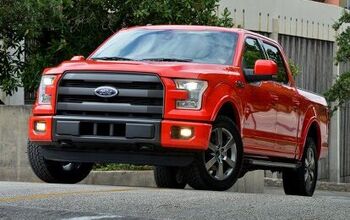DOT: 150mpg CAFE by 2015
That's provided Senator Clinton gets elected president. No, no. Just kidding. (I think). According to the Detroit News, "The U.S. Transportation Department today will propose a sweeping increase in fuel economy standards, requiring passenger cars to average 35.7 miles per gallon and light trucks 28.6 mpg by 2015." That's average folks. So for every 14mpg non-hybrid Escalade (should such things exist) that GM sells (should such a thing exist), they'll have to sell a light truck that achieves 42.2mpg. Maybe. But first, the hype. "Transportation Secretary Mary Peters will unveil the proposed regulation at an Earth Day event in McLean, Va., at a Federal Highway Research facility. Peters will make the announcement against a backdrop of vehicles from the large automakers, including Detroit's Big Three. A source who saw her prepared remarks said Peters plans to call the proposal 'ambitious but achievable.'" So, a nice photo op and some props for a lame duck Prez, then. But here's the real deal: "The proposal also reforms the way fuel economy numbers are set for passenger cars. Instead of one overall number, the proposal sets a series of requirements based on the size, or attributes of the car. It's not clear how the attributes will be defined or how the system will differ from a similar reform of light truck fuel rules in 2006."
More by Robert Farago


































Comments
Join the conversation
I agree with RobertSD. Raise gas taxes and forget about CAFE. Eliminating CAFE will eliminate the games car makers play with fleet gas mileage. If the car makers can find the customers willing to pay the price to fill up their gas hogs, more power to them. And if I want a Hummer and am willing to pay the price at the pump, I should be able to do that as well.
You know, it's actually going to be enjoyable seeing you "tax em outa their SUVs" communists sitting in your little worker housing cubicles eating soylent green... until you no longer serve any purpose and they just euthanize ya. You'll have earned it.
Golden2husky, The problem with registration taxes is that they punish those who use less fuel in their guzzlers, like me, while rewarding 50k a year drivers of small cars. Furthermore, it puts in a disincentive for owners to upgrade their vehicles. Especially fleets. If you tax older vehicles based on fuel mileage you will outrage the poor, and mostly cause an increase in fuel consumption! What happens is that people who own a truck for weekend use only either sell it, or the other vehicle that replaces it during the week. They increase their fuel burn, but save money on the registration fees and taxes. If they sell the occasional use truck, it will likely go to someone who will now use it daily. Without the incentives created by the new tax, that person may have been more likely to buy a newer, more efficient vehicle. If you want to use taxes to modify fuel use behavior, the only way that makes sense is fuel taxes. If you want to raise those, then lower some others. Good luck with the latter.